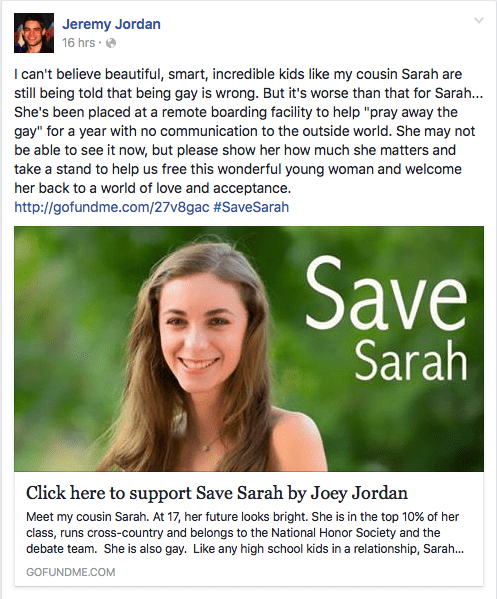I have a good friend who was sent to a Christian home for troubled teens in Florida in the late 1990s. The stories she tells me are horrifying. The children were forced to work in the fields all day every day in the summer, and for long hours during the school year as well. While the home was co-ed, the girls were responsible for preparing and cleaning up all of the meals, on a rotation linked to their dormitories. The home used the ACE program, a curriculum used by Christian private schools and home schools that forgoes the need for a teacher, instead requiring the children to read silently out of workbooks in individual cubicles while being overseen by classroom monitors. But it was also worse than that. My friend tells stories of whippings, and of being forced to hold girls down and participate in brutal beatings. The home was run as a prison camp, the teens treated as slaves.
My friend is a lesbian. While she was not explicitly sent to this home to cure her of the gay, and while she was not yet “out” at the time, she wonders if some inkling of her sexuality played a role in her parents’ decision to send her to this home. My friend is also not alone in her experience. The United States is dotted with homes like the one she attended, and in many states they are completely unregulated. Furthermore, because of the emphasis our society puts on parental rights, parents are legally allowed to send their child to such a home for any reason regardless of the child’s desires up until the moment a child turns 18.
All of this came to mind when reading a recent Facebook post by Jeremy Jordan, the actor who plays Winn in CBS’s new Supergirl TV show.

Here is more from the campaign’s gofundme page:
Meet my cousin Sarah. At 17, her future looks bright. She is in the top 10% of her class, runs cross-country and belongs to the National Honor Society and the debate team. She is also gay. Like any high school kids in a relationship, Sarah and her girlfriend wanted to go to prom together. But when they did that, Sarah’s parents, who believe that homosexuality is a sin and abnormal, sent Sarah away against her will to an East Texas Christian boarding facility for troubled teens to “pray away the gay.”
Not only does this type of “therapy” not work, mental health professionals from organizations like the American Medical Association and the American Academy of Pediatrics have found it to be psychologically damaging, especially for minors. And Sarah has been told that she must stay in this facility for a whole year. So instead of being surrounded by friends and extended family who love and support Sarah for who she is, she’ll be isolated in a place where the fact that she is gay is treated as a sin and an illness. Instead of preparing for college and competing in the state debate tournament, she’ll be doing forced labor every day and enduring Bible-based “therapy” for her “disease.”
She is not allowed phone calls or email or any form of computer communication. She is also not allowed visitors and cannot leave the property. She is completely cut off from the outside world. She tried to run away, but was caught by the staff and returned to the facility.
Sarah’s extended family and close friends are trying to win her release through the legal system, but it’s not cheap. Attorney’s fees in the first few weeks have already exceeded $20,000, and they are continuing to mount, with a full hearing set for July. Sarah needs your help. But this is about more than just one gay kid – if we free Sarah we can help show that it’s not okay to try to make gay teens straight by sending them away and using the threat of God against them.
Spread the word so being gay doesn’t mean losing freedom for Sarah. #savesarah.
I cannot vouch for Jordan’s story, and do not have the means to fact check his funding campaign. What I can say is that such homes do exist. They tend to be highly secretive. And in Texas? Troubled teen homes in Texas are exempt from state requirements and oversight if they are religious in nature. Homeschoolers Anonymous recently posted an article that touches on Texas’ lax oversight of such homes.
In [1997] with the hope that deregulating faith-based programs would increase their efficacy, then-Texas governor George W. Bush pushed for a legislative package that would allow church-run child-care institutions to opt out of state licensing.[xxix] This was an exemption to the requirement established in 1975 by the Child Care Licensing Act because of child abuse at the Roloff homes [evangelist Lester Roloff’s homes for troubled teens]. The primary witness to speak in favor of the bill before the House Human Services Committee was Gibbs III, [a Christian attorney] who was employed by the CLA at the time.[xxx]
According to the American Bar Association Journal, Gibbs III intentionally misled the committee to give the impression he was not connected to the Roloff Homes through the CLA.[xxxi] . . .
Regardless of whom he represented, Gibbs III’s efforts on behalf of the legislation paid off. The legislation passed, allowing the troubled children’s network to return to Texas, once again without state supervision or licensing. When asked during this time about the three-decades-long history of abuses in the industry, Gibbs III described it as “a glitch alleged with one ministry.”[xxxii]
Yes, you read that right. Christian homes for troubled teens in Texas were for a time required to meet basic standards, but this requirement was repealed in the late 1990s. Despite numerous instances of beatings, food deprivation, severe emotional abuse, and child torture—instances that prompted the state to act in the first place—these homes no longer operate under state requirements or with state oversight. This isn’t just a Texas problem. These homes dot the country, and when a state does pass regulations for these homes they often skip the state, relocating in a place where they can again operate in utter secrecy, and often in complete isolation.
The abuse isn’t over, either. It’s not a thing of the past. It’s ongoing. My friend’s brush with these homes—and the horrors they can contain—may have occurred two decades ago, but her experience is not a thing of the past. Here’s an excerpt from the very beginning of the above Homeschoolers’ Anonymous article:
When Jeannie Marie picked up her daughter Roxy from New Beginnings Girls Academy [in Missouri], her daughter was a shadow of her former self. Three months at the academy destroyed her. She endured food deprivation, medical neglect, and severe emotional and physical abuse. Despite urinary tract infections and menstrual complications from a recent gang rape, she was routinely denied toilet paper and sanitary pads, locked in isolation cells, and forced to say she was “the daughter of the devil.”[ii] In desperation, the 17-year old attempted suicide.[iii]
Roxy is not a unique case. Many girls at New Beginnings attempted suicide, hoping that a trip to the hospital would allow them to escape the horrors of the academy.[iv]
New Beginnings Girls Academy is a part of a massive, complicated network of homes for “troubled children.” The homes date back to the 1970’s, when an Independent Fundamental Baptist preacher by the name of Lester Roloff had the idea to create homes to reform children considered sinful or wayward by their parents. Roloff described such children as “parent-hating, Satan-worshiping, dope-taking immoral boys and girls.”[v] Often times the children sent were, like Roxy, “troubled” simply because they were victims of child abuse.[vi]
. . .
Tragically, the child abuse continues, even to this day. Roxy’s story, with which this story began, occurred only a few years ago in 2011. Many of these homes continue to exist, renamed or moved to other states [such as Texas or Missouri] where they are exempt from state licensing or oversight.
New Beginnings Girls Academy is still around, still operating, and still presenting a rosy picture to the public. A cursory appeal to google suggests that Roxy’s story is not unique. One self-described survivor of the home has operated a blog.
New Beginnings Girls Academy is the girl’s home that I was placed in by my mom. . . . They claim that their program offers a combination of spiritual guidance, Biblical teaching, and a healthy, loving atmosphere to help develop character and provide a foundation for confronting the many complex decisions in “growing up.” What they don’t say is ANYTHING about what the home is really like. They don’t bother to mention their ways of dealing with issues, how they enforce their religion, and how they prevent the student from anything outside the home such as abuse hot lines, doctors, dentists, etc.
. . .
. . . Bill McNamara, the owner of the home, would scream in our faces about how we were going to hell, our families were going to hell because of us, we were sinners, we were unclean, and many other things. Bill McNamara is the leader of the home as well as his wife, Jennifer McNamara. During my stay of two and a half years, the most staff members we ever had at one time were three. Usually it was only one staff member to ever fifteen to twenty girls. The McNamara’s were really obsessed with anything to do with sex, sexual orientation, or anything else sex-related. I can remember several separate instances of Bill McNamara coming into our dorm and saying, “It smells like sin in the camp.” What he was referring to was that him he could smell masturbation had been going on. I never did see anyone masturbating, but still, he was obsessed with that. . . .
I was one of the very few that came in as an open, out lesbian. I did not hide my sexuality. . . . Bro Mac (as we were supposed to call Bill McNamara) preached at me numerous times screaming about homosexuality being “nasty” and “gross.” On one occasion I remember him conducting chapel. That night he was running around the cafeteria and screaming like a wild man and throwing tomatoes as he screams about hell. He literally got his face as close as he could to mine and screamed at me for being a “fag.” He screamed that he would “never let no girl lay lips on me” and how nasty I was. Him and his wife focused on bringing me down each and every day to break me down into the perfect little Baptist that they wanted me to be. I can’t tell you how many thousands of tears ran down my face during those long two and a half years. . . .
When I wasn’t “right with God” according to them, they would put me as well as many other girls on “discipline.” Discipline was one of the many cruel forms of torture there. We were all required to stand facing the [wall] for hours. We had to stand with our toes to the floor board and just stare literally only a couple inches, if that, away from the wall. . . .
Life off of discipline was not very much better. We were not allowed to talk at all to each other unless it was “Friday Fun Night.” Only then, on Friday nights, were we allowed to talk to each other. If they noticed that you were getting “too close” to someone, as in becoming too good of friends with someone there, they would automatically place you on “separation” from that person. Separation meant that you could not look at, talk to (when allowed to talk), comment off of, take anything from, give anything to, etc that person that you were separated from. Their main goal was to make you feel like you were alone by isolating you from anything familiar. We were not allowed to talk about our past at all. Phone calls were allowed one time every two weeks for fifteen minutes each. We could not call out, our parents had to call us. If we were to tell our parents that we were not okay, something was wrong, or anything else “negative” about the home, the staff would automatically discontinue the call. We were allowed to write letters every Friday. The letter was required to be a page and a half. Those were heavily monitored. Anything at all showing that you were unhappy was threw away. Letters mailed in to us were also read. If anything talked about our past, friends, or anything, they would throw them away and not tell us. Our parents could only visit once every six months for three days. To get a visit, you had to be in the home for six months and be going along with the program to Bill McNamaras satisfaction. If you “weren’t right with God,” still upset about being there, or a threat to them that you might run away, you would not get a visit no matter how long you were there. Life was hard.
The home was on 24/7 lock down. We could not leave anywhere even if we wanted or needed to. If a door didn’t have a lock on the inside, staff or extremely trusted girls would have to sit or stand in front of it. We called that “posting.” If anyone came close to the door, the person posting was allowed to hit them or do whatever it took to get them and prevent them from running. I can’t tell you how many times I would sit there wondering if I would ever get to leave the home.
You can read more horror stories in this article by Kathryn Joyce. I want to emphasize again that sending a child to one of these homes for any reason is perfectly legal. It’s also not the only means evangelical parents of LGBT teens use to isolate their children. Leelah Alcorn‘s parents homeschooled her in order to remove her from the support network she had found, as a transgender teen, at her public high school. Leelah had no say in this decision. Life in enforced isolation in her parents’ home, where she was told by her parents and her church that who she was was wrong and sinful, became too much for Leelah. In January 2015 she walked in front of a truck, leaving a note begging the world to change.
I don’t know where Jordan’s cousin Sarah was placed or how she is faring. I only know that he is right to worry. I think of my friend, and of what she endured in a Christian home for troubled teens as a child herself, and I grieve.















